Matériaux spéciaux
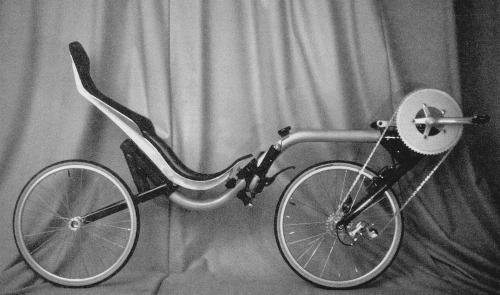
En 1993, le NVHPV a organisé un concours de design, qui a été gagné par cette copie merveilleuse d'un Flevo. Il a été construit en tubes ronds d'aluminium avec une fourche arrière unilatérale et un siège en aluminium développé par le constructeur. Le vélo a gagné le "Aluminium Award" aussi. (Robert Sluijter a fini ses études à l'Université de Delft (NL) avec la Flevobike Greenmachine)
| Année: | 1993 |
| Endroit: | ? |
| Constructeur: | Robert Sluijter |
| Source: | HPV-nieuws 9/5 page 12, 10/1 page 9, 10/2 page 12 |
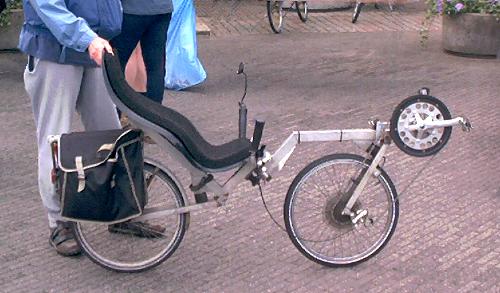
Un Flevobike en acier inoxidable.
| Année: | 2002 |
| Endroit: | Lelystad (NL) |
| Constructeur: | Unconnu. Acheté d'occasion en mars 1997 par Wander Rotensen |
| Source: | Photo de Erik Wannee |
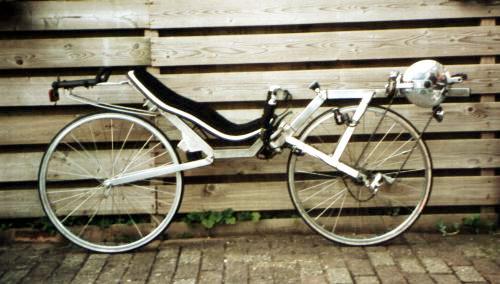
Un FlevoRacer en acier inoxidable.
| Année: | 2002 |
| Endroit: | ? |
| Constructeur: | Inconnu. Construit en 1997. |
| Source: | Photo de Marten Kraayvanger |

Le tricycle 'Woody" de Nicolaas Pinter. Presque le cadre entier est construit en bois laminé.
| Année: | 1993? |
| Endroit: | Antwerpen (B) |
| Constructeur: | Nicolaas Pinter |
| Source: | HPV Nieuws 9/6 page 12 |
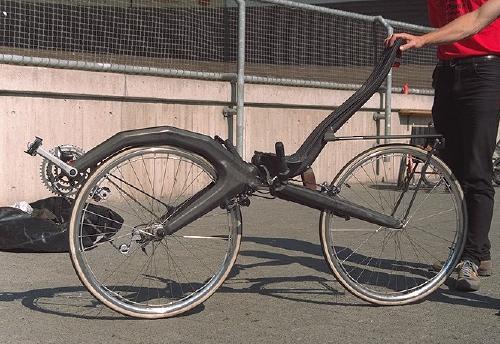
Un Flevo au fibres de carbone.
| Année: | 1997 |
| Endroit: | Championnat du monde à Cologne (D) |
| Constructeur: | ? |
| Source: | Photo de Ingo Kollibay |
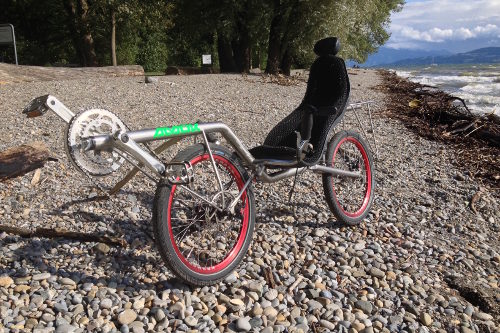
But de ce travail de projet d’études de Steffen Kanon était un développement de la construction du Flevo Racer. Inspiré par le Racertje de Martin Anderseck, il a construit un vélo qui est en même temps compact (dû à ses roues 20 pouces) et utilisable à part entière en tant que vélo de randonnée.
Le pivot est construit en charnière avec des anneaux élastomères à l’intérieur comme amortisseurs de pilotage. En même temps , on a attaché une grande importance à une reduction du poids (14,5 kg pour le vélo en photo) et au design. Le vélo est construit en tubes d'acier inoxidable. Avec les phares intégrés dans les tubes du cadre, il rapelle les vélos Van Moof. Autres éléments de design sont la fourche arrière d'un tube rond divisé et le porte-bagages qui permet de stationner le vélo en verticale.
Des informations supplémentaires peuvent être demandées directement chez le constructeur.
| Année: | 2015 |
| Endroit: | Ecole technique supérieure de Ravensburg-Weingarten / Allemagne |
| Constructeur: | Steffen Kanon |
| Source: | Photo du constructeur |

This is a variation of the Flevo Racer in a classic Randonneur style by frame builder Thomas Becker. He built the bike in two weeks shortly before the Bespoked Framebuilding fair which took place in October 2025 in Dresden / Germany. Being the only recumbent bike at that fair, it won the "Best Bike in Show" award.
Thomas got in touch with the Flevo concept already many years ago but never completed a Flevo before this one. He used the building plans from the Flevofan website for the geometry, bought a second-hand Flevo seat and a discounted suspension strut and started building the bike around it. Among other things it uses 29" wheels with wide tyres, classic Schmidt headlamps that he converted to use LEDs instead of halogen bulps and a choke lever from an old Eastern German motorbike to lock the suspension strut. The rear suspension differs completely from the original Flevo design and uses 1" headsets (yes, we're in classical bikes) as bearings. When the bike was presented at the show, Thomas hadn't done a testride on it yet as he didn't want to damage it when exercising. He plans to do at least a 200 km brevet on it. Just like the authors of the Flevobike Fanclub he's looking forward to finding out if the dimensions of the front fork will be sufficient. If not, we may probably look forward to a beautiful solution.
You can find more pictures of the bike at the builder's blog.
| Année: | 2025 |
| Endroit: | Groß Lüben / Germany |
| Constructeur: | Thomas Becker / Meerglas Framebuilding |
| Source: | Addam Gasson at Bespoked Fair |
